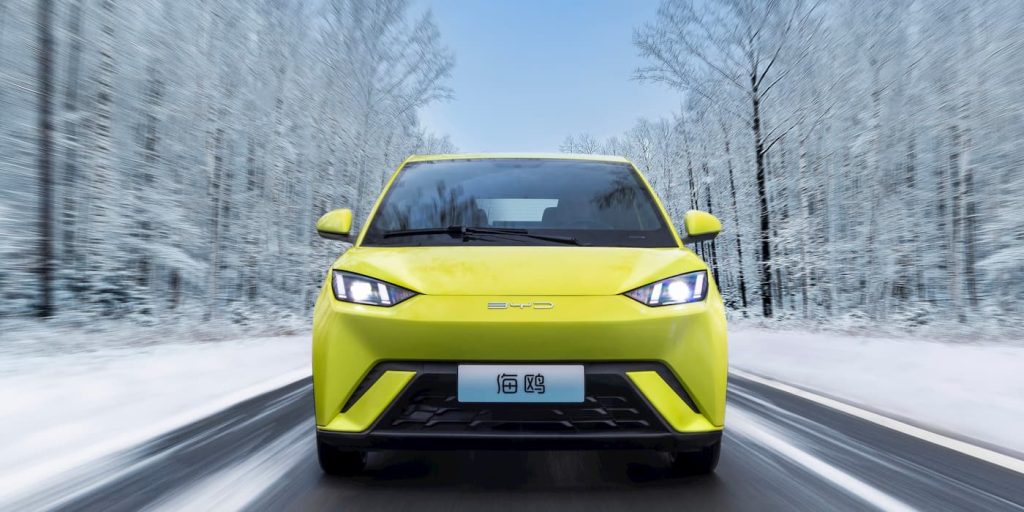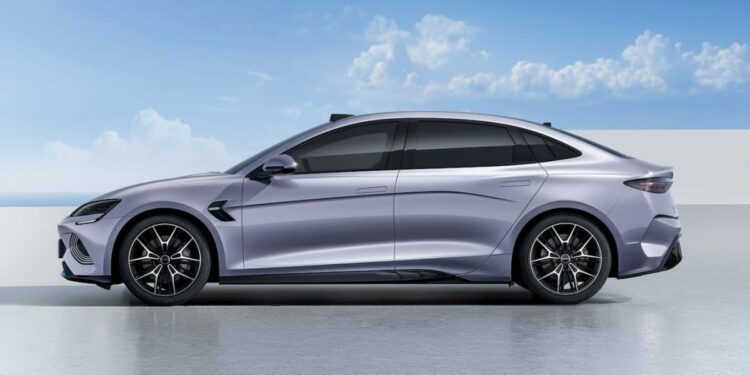“There is the possibility that even with the 100-per-cent tariff, that they could still launch a model that could compete, but it’s a matter of which one, if it’s the right model for the market,” Lei Xing, China auto industry expert analyst told Automotive News.
The BYD Atto 3 and Seal seem likely candidates, he said, but US and Canadian consumers would likely have to pay a lot more for them (I guess BYD would be willing to absorb costs only to a point).
In France, for example, you can get an Atto 3 for about $45,000, and a Seal for $65,000. Of course, the subcompact BYD Seagull, the brand’s smallest car that sells for around $10,000 in China, would be an easier choice in terms of cost control. The brand plans to launch a European version in 2025, but the North American market isn’t as welcoming to small cars, Lei Xing said.
 BYD Seagull. Source: BYD
BYD Seagull. Source: BYD
The North American move is on hold for now, Chinese brands as ambitious as BYD won’t likely be put off by tariffs for too long – it’s just a matter of when, and with which vehicle.
“Imported vehicles cost a lot more, but these companies really want to be into this marketplace, said Sam Fiorani, vice-president of global vehicle forecasting at US-based AutoForecast Solutions, told Automotive News. “North America is the crown jewel for any global automaker. So, finding a way to get any volume sold, they’ll take the cost.”
Some other options too cited by Fiorani include building market share and brand recognition – where I am in France, BYD ads are literally everywhere. Next step, set up assembly plants somewhere in North America, or import vehicles into Canada from other countries other than China – but then again, Canada could respond accordingly with tighter restrictions, so it’s a moving target.
Also, over-the-air infrastructure for Chinese vehicles could be problematic since Canada seems likely to follow the US’s proposed rules banning Chinese hardware and software for connected vehicles in the interest of national security. So in order to work around that, companies would need a separate OTA infrastructure to process data locally, not back and forth to China.
Meanwhile BYD is seemingly very large and in charge. It’s currently ramping up production by close to 200,000 units to meet demand, and the company has hired nearly 200,000 new employees over the past three months.
Photos courtesy of BYD
If you’re an electric vehicle owner, charge up your car at home with rooftop solar panels. To make sure you find a trusted, reliable solar installer near you that offers competitive pricing on solar, check out EnergySage, a free service that makes it easy for you to go solar. They have hundreds of pre-vetted solar installers competing for your business, ensuring you get high quality solutions and save 20-30% compared to going it alone. Plus, it’s free to use and you won’t get sales calls until you select an installer and share your phone number with them.Â
Your personalized solar quotes are easy to compare online and you’ll get access to unbiased Energy Advisers to help you every step of the way. Get started here.
FTC: We use income earning auto affiliate links. More.
Source link : http://www.bing.com/news/apiclick.aspx?ref=FexRss&aid=&tid=6733196464e64632b6a784794a1d447e&url=https%3A%2F%2Felectrek.co%2F2024%2F11%2F07%2Fbyd-puts-the-brakes-on-its-canada-launch-for-now%2F&c=3132065277691850478&mkt=en-us
Author :
Publish date : 2024-11-07 02:12:00
Copyright for syndicated content belongs to the linked Source.












